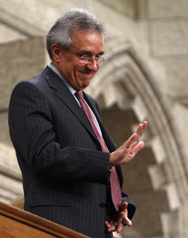By Joe Friesen and Jacquie McNish and Bill Curry
Globe and Mail
October 21, 2008
http://www.theglobeandmail.com/servlet/story/RTGAM.20081021.wCommission22/BNStory/National/home
OTTAWA — As one of the commissioners put it Tuesday, how can it be that the commission given the historic task of helping Canada toward a national reconciliation on Indian residential schools was ultimately unable to reconcile with itself?
Justice Harry LaForme's sudden resignation as commission chair Monday, in which he cited an intractable power struggle with the other two commissioners, has at a single stroke thrown the entire process into doubt. One native group, Ontario's Anishinabek Nation, said Tuesday it has lost confidence in the commission and that the two remaining commissioners must be fired.
 |
| Justice Harry LaForme, chair of the Indian Residential Schools Truth and Reconciliation Commission, waves after being recognized by the Speaker in the House of Commons on Parliament Hill in Ottawa April 28, 2008. Photo by Chris Wattie |
The commission's unravelling was swift, according to Jane Brewin Morley and Claudette Dumont-Smith, the two women who Judge LaForme said repeatedly challenged his authority and vision, dooming the group to failure.
The three commissioners met fewer than six times since they were appointed in June, they said. The last meeting was on Aug. 26, when Judge LaForme left abruptly, saying he was unwell. He cancelled a meeting for the following day, and thereafter refused all meetings and insisted that Ms. Dumont-Smith and Ms. Morley communicate with him only through intermediaries, the two women said.
They had to work through e-mails sent to commission lawyers, who would then pass them on to Judge LaForme. Judge LaForme was following what he called a medically supervised schedule, but which other sources referred to as stress leave.
The impasse continued through September as Judge LaForme found himself blocked by what he saw as Ms. Dumont-Smith and Ms. Morley's determination to outvote him on every issue. Then Judge LaForme, an appeals court judge, turned to Ontario's Chief Justice Warren Winkler for help.
In an attempt to broker a truce between the feuding commissioners, Chief Justice Winkler dispatched Will McDowell, a Toronto lawyer and former associate deputy minister of justice.
Ms. Dumont-Smith and Ms. Morley said they were shocked to learn that Judge LaForme had obtained a court-appointed mediator, without informing them first.
The three of them met with Mr. McDowell on Sept. 30 in the Bay Street offices of Lenczner Slaght Royce Smith Griffin LLP. It was described as an introductory meeting, civil in tone, but it was clear the parties had significant differences.
Judge LaForme felt that as chair, he was in charge. The two commissioners felt all three should be equals, according to a person familiar with the process.
"I'm a lawyer, but I'm also a mediator, and one of the problems here is that we didn't have enough interaction," said Ms. Morley. "I believe that whatever issues there may have been we could have worked through them. But that wasn't the case. I respect Justice LaForme's decision and am saddened by it. He had his reasons and we'll move on."
Judge LaForme declined an interview request, but in his letter of resignation he said a major stumbling block was that the other two saw the commission as primarily about finding truth, and less about reconciliation. The two women deny that charge.
In Ottawa, Assembly of First Nations National Chief Phil Fontaine urged the government to find a replacement for Judge LaForme as soon as possible.
While John Beaucage, grand council chief of the Anishinabek Nation of 42 Ontario native communities, called for all three commissioners to be replaced, Mr. Fontaine repeatedly avoided any criticism of the other two commissioners.
"We insisted that there be three commissioners. We never contemplated that there would be one commissioner [who] was more important than the other two commissioners," Mr. Fontaine said.
"It was always seen as a commission that operated on the basis of consensus."
At Mr. Fontaine's side at the news conference was former student Bill Wuttunee of Calgary, who expressed a clear sense of hostility toward Judge LaForme's decision.
"Just because one person quits, [it] doesn't mean there's a disaster," said Mr. Wuttunee, who in 1961 became the first chief of the National Indian Council, which later became the AFN.
"It just means that he probably wasn't qualified to handle the job in the first place. He obviously talks about his health in that letter, if you examine it carefully, and that's a big issue: Did he have the enthusiasm to work in that position or was he too lazy? That's the question."
Judge LaForme was also criticized by leaders from the Nishnawbe Aski Nation of Northern Ontario. Although they initially supported his appointment, they were critical of the decision to name Owen Young as senior counsel to the commission. Mr. Young was crown counsel in the legal standoff that saw six members of the Kitchenuhmaykoosib Inninuwug First Nation go to jail for blocking a mining exploration company. Mr. Young resigned from the commission at the same time as Judge LaForme.
Any original material on these pages is copyright © BishopAccountability.org 2004. Reproduce freely with attribution.